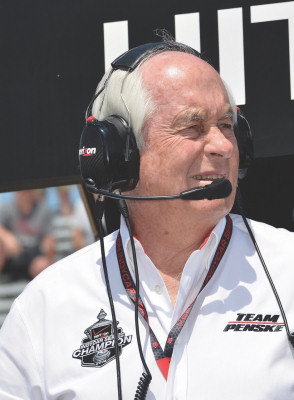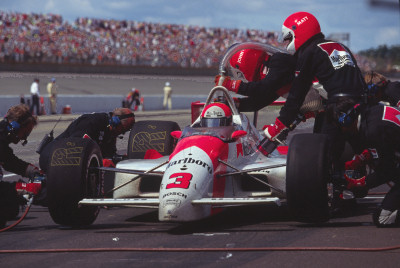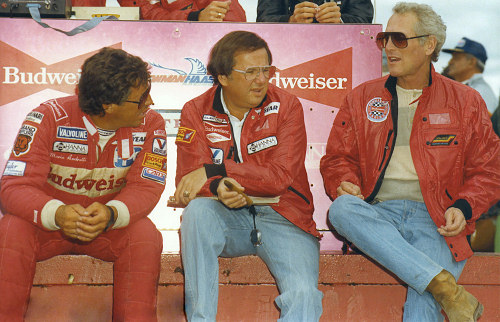The Way It Is/ Motor racing is an inspiring worldby Gordon Kirby |

© Racing is all about getting the job done and I feel tremendously lucky to have spent more than forty years meeting and talking to so many highly motivated people amid a get-it-done environment. Looking back, I could not be more privileged to get to know numerous great men with big hearts, true team leaders such as Dan Gurney, Mario Andretti, Parnelli Jones, Jim Hall, Brian Redman, the Unsers, Gilles Villeneuve, Keke Rosberg, Rick Mears, Emerson Fittipaldi, Alex Zanardi and many more. All this strikes a delightfully positive contrast to the misery of the current political season where so much of the rhetoric is about dysfunction. In recent weeks I've said to a few friends that it's sad so little attention is paid in the media to people like Roger Penske who are the essence of the can-do American Dream. Penske and many other entrepreneurs like him spend their days working hard to understand and run their businesses. They create thousands of jobs and stake their success on delivering the goods and providing first class customer service.  © Steve Swope "Roger understood from day one that you cannot be successful without having the best car if you can have it," Kainhofer observed. "He was always looking for the best car and obviously he was looking for the best people. That's the combination you need. From day one he was always moving up and up and up. He started with Bob Holbert's old Porsche RS Spyder in the winter of '58 and '59 and as soon as he found an RSK he bought that and just moved up as fast as he could. "And the other thing is we always strived to look better than the next guy. I did that from day one and that's what Roger wanted too. We always wanted to look good and we always wanted to run all day. He and I always had the same philosophy. I wanted my car looking better underneath than most people's did on top. If it went upside down I wanted the bottom to look as good as the top and we worked hard at making it that way. "We weren't always the fastest but we tried to run all day. That was Roger's thing from day one. People would give him money to put into race cars because he had a good-looking car, and of course, he tried to perform well. That was his edge from day one. There's only one winner and the rest are second places losers. I always said second place is first loser. People only remember the guy who wins. "I worked for Penske for all those years but in all fairness I always felt it was my business," Kainhofer adds. "Whatever I worked on, whether it was a car, a building or an engine, I treated it like it was mine. I felt my job was to build it up and make it better. The first few years at Penske Racing were very difficult. We had a tiny shop and I tried to save everything I could so there was as little waste as possible. But really, that's the way I've led my whole life." Working with Karl on his biography was a great pleasure. He's a delightful man, tremendously motivated and focused with a warm, dry sense of humor. I can say similar things about another Penske alumnus, Rick Mears. About ten years ago I spent a couple of years working on Rick's biography, 'Rick Mears, Thanks,' and the title truly reflects Rick's approach to life and his career in motor racing. Across the entire spectrum of sports, Rick stands out as a particularly fine example of a sportsman who remained entirely unaffected by superstardom and the idolatry of the fans. "Over the years, I never felt like I changed that much," Rick remarked on the book. "I've seen people change and I really have trouble understanding how they change. I've tried to change myself for the better and it's hard to make yourself be somebody you aren't." Rick says there were times when he had to bite his lip and defer to the occasional rude person among a sea of admiring fans.  © steve swope / mears collection "But the fans are the ones who pay the bills and make our sport what it is, and you've got to take care of them. I appreciated having the opportunity to be in that position. A lot of people tend to complain about it, and I have over the years from time to time when I was in a bad mood. But you're very fortunate to be in that position. That's what you have to remember. You've got to keep your feet planted. "You have to work at it because it's easy to get upset and get mad," Rick adds. "You've got a lot on your mind, and one day you're struggling with the car when it's not working right and you're fighting to try to do the job. You get out of the car and it's not working well, and you've got a sandwich in one hand and a Pepsi in the other and you're trying to take a quick bite. You're having a bad day and suddenly someone says, 'Sign!' They don't ask you. They tell you to sign. "When something like that happens, it tends to upset you. That's when you have to bite your lip and say, 'Okay, thank you.' And go on down the road. But there's a time and place for everything. At the right time and right place, it's a lot of fun. You enjoy talking to people and hearing their comments and having conversation with them." Wise words for any racing driver or sportsman. Then of course, there was the late, great Paul Newman, a very rare man. He was one of Hollywood's biggest stars and was also renowned as an honest gentleman of few words and a philanthropist who founded the 'Hole in the Wall' Camps for disadvantaged children and gave more than $250 million to help poor kids around the world. Newman was one of the most laid-back yet fiercely motivated of men. He spoke quietly and thoughtfully. The words didn't tumble out. Often, there was a pause after a question as he considered his reply. He possessed an artist's temperament and a racer's soul and was a totally straight, fine man who always did the right thing for his family, friends and employees as well as the many children he helped through his 'Hole in the Wall' camps. Over the last twenty years of his life Newman established ten camps--eight in the United States, one in Europe and one in Africa--and philanthropy became the defining element of his life. Newman was also a a passionate amateur racer and co-owner with Carl Haas of Newman/Haas Racing. PLN continued to drive race cars into his eighties until only a few months before the end of his life back in 2008. "I don't expect any miracles, but so long as I don't embarrass myself I'll keep doing it," he once remarked to me. "There's a lot of crap out there and it seems to me I get into more of it than most people. Maybe it's because I'm doing too many things. But just get in the car and all of that runs out of your toes. There's just such a sense of peace in there.  © Racemaker/Hutson "Nothing takes the place of racing," he quietly added. "To enjoy the sensation of driving and racing, and to really be able to see the effect of it in your mirrors, that extra ten feet you built up coming out of a particular corner, you know that's a kick in the ass!" Newman was forever a racer and at the races he was just one of the boys, low-key and enjoying the occasional beer and a practical joke or two. He was also a very special man, a rare kind of guy who anyone in their best moments aspired to be. Veteran Newman/Haas crewman Tim Homburg, aka 'Dog', adds his personal memory of Newman. "It was a great experience to work with and for him," Homburg says. "He was definitely part of it. He was right there in the pits with us at the races and he showed up at quite a few tests. "Being a driver himself he knew a fair bit about racing. When he came up and talked to you about something he had a pretty good idea of what he was talking about. He wasn't just making small talk. He didn't know all the details but he knew the basics. He was quite knowledgeable and a funny guy. He'd sit down sometimes with us and tell stories and have a laugh. "Those of us who got to work with him and around for sure miss him. He was part of us and he tried to do it unceremoniously. He was just another guy, a humble guy. He wasn't a movie star or a celebrity. "In my opinion, he was somewhat shy. For all that he had done he liked to be in the background. He just wanted to be at the races and he didn't miss very many of them. He had a passion for it, no doubt about it. It was a treat to be around him." Indeed it was. Similarly, it was a pleasure to know so many great drivers, some of them mentioned at the beginning, as well as extremely bright, highly-motivated designers and engineers like John Barnard, Patrick Head, Gordon Murray, Adrian Newey, Tony Cicale, Nigel Bennett, John Ward and Bruce Ashmore. As I look around at the wider world I therefore count myself a very lucky man to have enjoyed such company over the years as well as the great spectacle they helped produce. |
|
Auto Racing ~ Gordon Kirby
Copyright ~ All Rights Reserved |
